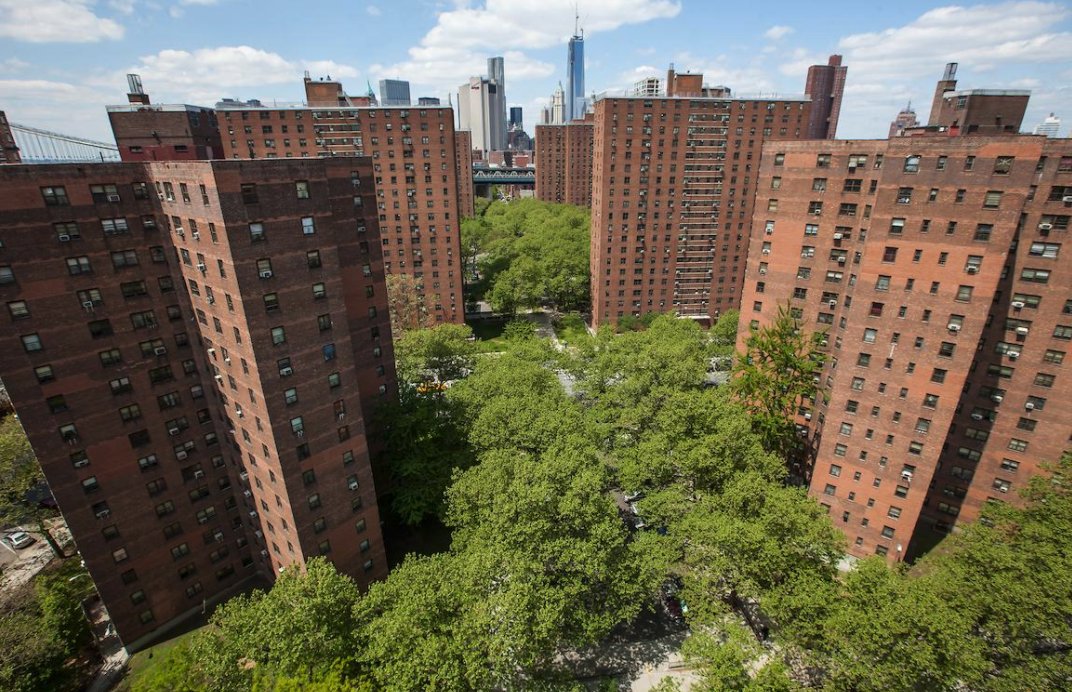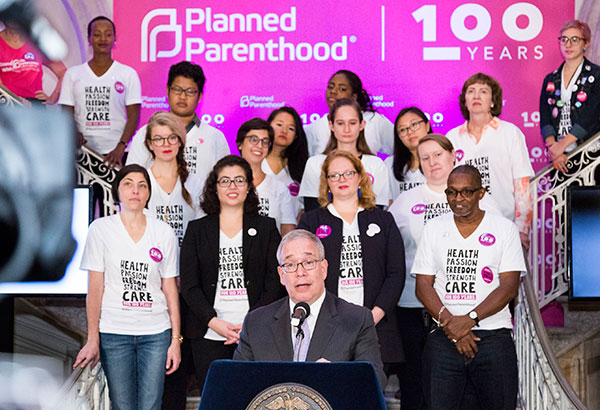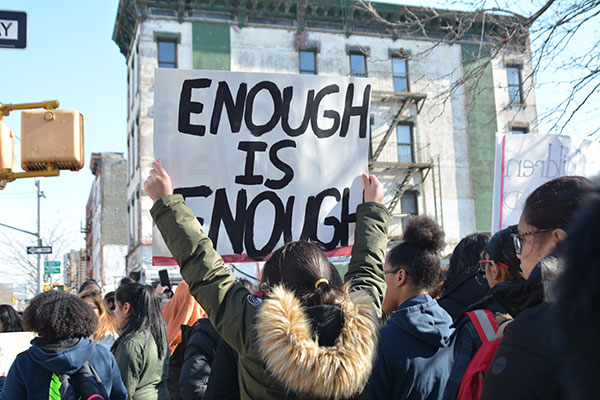I’m a NYCHA Resident Who Supports Private Investment in Public Housing

(photo: @NYCHA)
After a harsh winter during which hundreds of thousands of NYCHA residents suffered without heat and hot water at one time or another, many people across our city have been asking a simple question: do public housing residents deserve the same quality of life as everyone else?
The answer is obvious: of course we do. Better yet, there is a clear path to make that a reality, and soon.
The fact is that just a miniscule fraction of New Yorkers living in public housing enjoy the benefits of private management and well-funded maintenance operations. Hundreds of thousands of our fellow citizens do not – and they are bearing the burden of a system that faces a $25 billion deficit, with little hope for anywhere near enough federal funding on the horizon.
Around 320,000 of those residents went without heat or hot water at certain points this winter, often during the coldest stretches – and now New York must take action to ensure that this cannot happen again. Public-private partnerships will improve the living conditions of NYCHA families, and it is time for more of those agreements. Not next year, not in two years, not in three years. Now.
It is no secret that urging public-private partnerships for NYCHA is politically challenging – and I was once skeptical of these arrangements myself. But if that kind of collaboration means being able to ensure that every NYCHA family has heat when they most need it – and let’s be clear that this is exactly what is at stake here – then public-private partnerships are not a problem, as some critics have said, but are instead part of a solution.
I am a resident leader of a NYCHA building that has already benefited from this kind of work. I have firsthand understanding of the type of progress that is possible from these partnerships. Simply put, I am living in a success story every day, but my heart is breaking for the hundreds of thousands of residents still struggling underneath the weight of a broken system.
In 2014, NYCHA engaged in a public-private partnership at several Section 8 developments across the five boroughs – totaling nearly 900 homes including my building, Campos Plaza I – because of the potential benefits it could provide for families. Despite what skeptics said at the time, it turns out that they were absolutely right.
This winter, our building had the heat and hot water it needed. We got to cook in renovated kitchens. And, this spring, we will enjoy our playgrounds and other open space. Our rents did not increase, and we all feel secure in our homes because we know that NYCHA still has ultimate control of our building and retains the power to remove the private partner should it ever want to do so.
At a time when city funds are stretched so thin and federal funds are unlikely to arrive, these positive changes did not come from the wave of a magic wand. They exist because of resources made available through a public-private partnership that provided the necessary investment in our apartments.
It is, at the end of the day, a really simple concept: when there are not enough public dollars to ensure that NYCHA buildings receive the maintenance and renovations they need, public-private partnerships can fill those gaps and give residents like me a better quality of life.
It was encouraging to see NYCHA move forward on another public-private partnership to leverage private financing at its Ocean Bay complex in Bayside. At that nearly 1,400-unit development, which was battered by Hurricane Sandy and remained in dire need of improvements, the deal generated an additional $560 million in financing for better buildings and new infrastructure. Families in Ocean Bay, too, understand what is at stake.
And of course it goes without saying that NYCHA residents believe that the federal government should invest more in public housing. But the reality today is that we cannot yet expect significant federal dollars to come – and that is simply no reason to deny my fellow residents the same quality of life I get to enjoy.
So, yes, those of us living in public housing do deserve the same quality of life as those living in private housing – but all of us, not just a lucky few. All of us deserve a decent, comfortable home. The tools are out there, it is now up to elected officials to make that a reality by encouraging more private-partnerships across New York City.
***
Dereese Huff is the resident association president at NYCHA’s Campos Plaza I.
***
Have an op-ed idea or submission for Gotham Gazette? Email This email address is being protected from spambots. You need JavaScript enabled to view it.
Trump Administration Attacks on Title X Could Result in Even More Deceptive Women’s Health Clinics

Comptroller Stringer with Planned Parenthood (photo via @NYCComptroller)
The Trump-Pence administration just took aim at the Title X program—the nation’s long-standing program for affordable birth control and other sexual and reproductive health care that more than four million people nationwide, including 150,000 New Yorkers, rely on each year.
The administration issued a new call for funding applications that radically changes the program's priorities—and that will shift funding away from expert sexual and reproductive health care providers, to anti-abortion crisis pregnancy centers that masquerade as legitimate health care facilities solely to shame and mislead pregnant individuals about their reproductive health options.
There’s no denying it: This is all part of a coordinated attack on access to accurate sexual and reproductive health care information—and to access to birth control and safe, legal abortion.
The attacks don’t stop there. On Tuesday the Supreme Court heard its first major reproductive rights case since the confirmation of Justice Neil Gorsuch, Trump’s anti-abortion appointee—and the case could also change how crisis pregnancy centers operate. It will determine whether crisis pregnancy centers will be allowed to continue to lie to people about their reproductive health care options by calling it First Amendment promoted speech.
Let’s be clear – we must fight back against these attacks to ensure that New Yorkers, especially those with low incomes, continue to have the fundamental health care they need and deserve.
Since 1970, the government has awarded Title X grants to sexual and reproductive health care providers that offer contraception, STI testing, cancer screenings and more to help uninsured and underinsured individuals afford them. Historically, Title X is meant to ensure that every person—regardless of where they live, how much money they make, their background, or whether or not they have health insurance—has access to basic, preventive sexual and reproductive health care. This program is a critical safety net for many people who would otherwise go without health care, like those in low-income communities and communities of color who disproportionately face barriers to care.
When programs like this are under attack, it’s our most marginalized communities and at-risk families who stand to suffer the most. As a recent report by the New York City Comptroller’s Office showed, in 2015, 91 percent of people served under Title X throughout New York State were women, and 60 percent had incomes at or below the federal poverty line. Nearly one-third were uninsured.
The U.S. Department of Health and Human Services’ new guidelines for Title X would push these patients to go to facilities that emphasize abstinence-only ideology and that do not offer the full range of birth control options. The new guidelines are designed to roll back access to highly effective forms of birth control, like long-acting reversible contraceptives (IUDs and implants).
These guidelines also clearly open the door to anti-abortion fake clinics participating in the program, even though they use deceptive tactics such as providing medically inaccurate information to women, including lying about the gestational age of a pregnancy in order to make it harder for someone to access an abortion.
Already, throughout New York City, crisis pregnancy centers masquerade as legitimate health care facilities solely to shame and mislead pregnant individuals about their reproductive health options and prevent them from seeking abortion care. The new Title X guidelines could result in these fake clinics receiving taxpayer dollars and expanding, targeting even more people who are seeking legitimate reproductive health care services. These misleading anti-abortion facilities may continue to exist—but we shouldn’t be supporting them with federal taxpayer money.
This egregious attack on Title X is an attack on women and vulnerable communities, and on the rights of New Yorkers to make the health decisions best for them and their families.
All New Yorkers should have control over their sexual and reproductive lives. This includes the decision of whether, when, and how to have children, how to practice healthy and respectful sexuality, how to protect ourselves and our partners against STDs, and more. When we make our own decisions about our bodies and our health care, we determine our own futures. And when our reproductive autonomy is under threat, so too is our collective health and well-being as a community and as a city.
We will do everything we can to ensure that all people are empowered to take control of their health and their futures. We see the hostile agenda coming from Washington to take away our basic freedoms and target our most vulnerable communities, and we are ready to fight for you and with you every step of the way.
***
Scott M. Stringer is the New York City Comptroller. Laura McQuade is President and CEO of Planned Parenthood of New York City. On Twitter @NYCComptroller and @PPNYCAction.
***
Have an op-ed idea or submission for Gotham Gazette? Email This email address is being protected from spambots. You need JavaScript enabled to view it.
When Lawmakers Fail on Gun Sense, Generation Z Steps Up

(photo: Cristina Gonzalez)
We were 12 years old when 20 children and six adults were gunned down in Sandy Hook Elementary School. One might think this a bit young to be exposed to such a raw act of violence, and experience this shift where gun violence was now becoming an American norm. We felt lucky to be living in a state where gun laws were strict and fairly well-regulated. But Sandy Hook hit us both hard. To hear about a school full of innocent children being targeted, our stomachs turned over in grief and disgust, and our eyes were opened to an entirely unfamiliar world of hatred and distrust in our government.
The ability to own guns in this country is a result of our Second Amendment. A law written in the 18th century when our government was still fresh and new, we had just won our war against England and were planning on beating back any possibility of invasion. At the time, this law made sense. Our citizens had land to defend, and we wanted to be sure our central government didn’t abuse their power and create an oppressive regime. All these reasons made the Second Amendment perfectly reasonable at the time. Now, 227 years later, the original intentions of our Founding Fathers have come to be interpreted by some as an absolute, unflinching freedom to bear arms, for almost everyone of almost every kind of weapon -- even when those arms are not in any way necessary in the day-to-day lives of Americans or likely be used to fend off invaders or an overreaching government.
We want to preserve people’s rights and freedoms, though some might assume our position intends to infringe on that. For so many years, we have had to rely on our elected representatives, and the interest groups and lobbyists linked to Congress, to make real, national change on our behalf. They have failed us.
Our next congressional election is this coming November. With 470 seats up for grabs, and more than 2,400 candidates running, as newly-minted voters we realize that this fall we get the opportunity to choose who goes into those seats. We no longer have to put our trust into the people who have been letting us down and neglecting our safety year after year. Having the lives of American children threatened constantly, and the impending fear of possibly being the next victims of gun violence, has driven us to step up, and speak to our generation to finally make a call to action.
We first took steps to make sure that the March 14 walkout was not only happening in our schools but in others across the city. We provided students that didn’t have the resources or the ability to plan their walkouts with step-by-step instructions on how to conduct their own walkouts so they could make them as effective and powerful as possible while still remaining safe. In this process we found each other and together we created a platform we call Generation Z.
We’ve gathered over 2,000 kids and counting across the Greater New York Area in over 20 different schools and counting to ensure the work doesn’t end with the walkouts.
We have been working on policy points related to gun reform that need to be put in place, including the full implementation of background checks; the removal of military grade weapons and high capacity magazines; preventing teachers from being armed in schools; stricter regulations that would prevent the trafficking of guns into our state; better reporting of domestic violence convictions and enforcement of current laws barring those convicted of domestic violence offences from owning guns; and the removal of metal detectors, specifically within schools in communities of color, and replacing them with better school mental health departments.
We want Generation Z to be the platform we never had, and we don’t want to stop with the walkouts. We continue to raise money to go to Washington, D.C. to be heard on Capitol Hill. We want Generation Z to tackle the problems that we never had the opportunity to voice ourselves. We hope to gain the support of the adults in our communities, especially those with the means and privilege to help, to fulfill our mission to travel to Capitol Hill and to advocate for, and implement, much-needed change. We plan to show other young adults how to exert their power as voters and ensure progress is made. We are the future. We will be heard. We are Generation Z.
***
Amanda Delaney and Ella Marion are members of Generation Z. On Facebook: Generation Z for Gun Reform and on Instagram: @genz4gunreform.
***
Have an op-ed idea or submission for Gotham Gazette? Email This email address is being protected from spambots. You need JavaScript enabled to view it.




